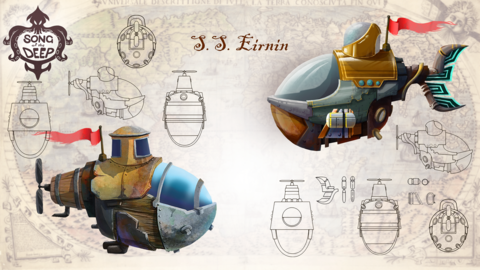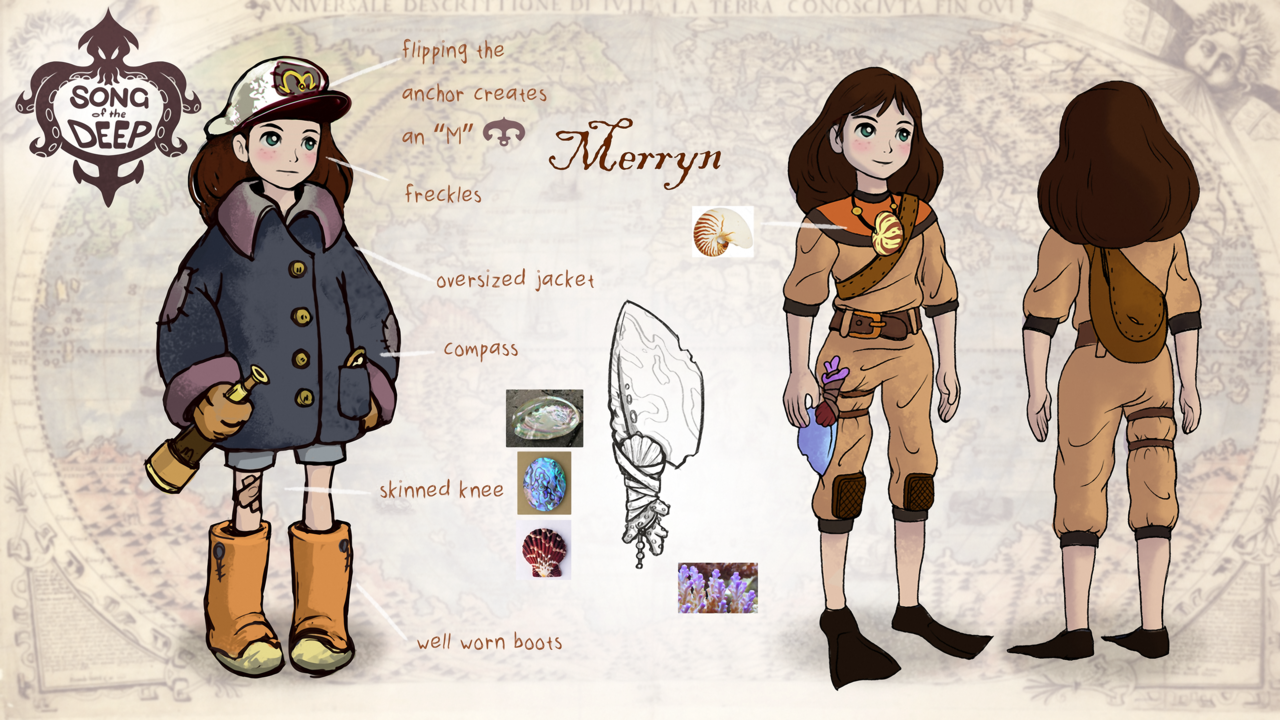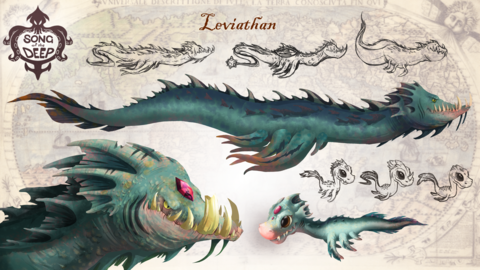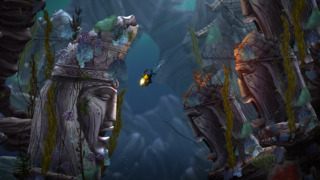This week, independent developer Insomniac Games revealed Song of the Deep, a 2D side-scrolling adventure starring a little girl searching for her father among deep sea ruins. The game is set to launch digitally this spring for PlayStation 4, Xbox One, and PC, with a physical retail version coming exclusively to GameStop.
Insomniac is partnering with GameStop to publish Song of the Deep, as well as support a full line of merchandise based on the title--including a children's chapter book. The studio is betting big on their little game, hoping that players can identify with its young, courageous protagonist and delve deep into the Irish myth-inspired story.
GameSpot sat down with Insomniac chief executive officer Ted Price, chief creative officer and Song of the Deep lead writer Brian Hastings, and GameStop Group global lead Mark Stanley, to talk about this unique partnership and what the team hopes players take away from their game.

GameSpot: Song of the Deep is different from everything Insomniac has done up to this point. I'm interested to hear more about the project's conception and why you decided to go with it.
Ted Price: In terms of the art style, for us, the team that's building it is passionate about stylized, vibrant, 2D art. That team has a lot of experience in the 2D realm. As a company I think we're all very passionate about those games that aren't restricted by real world conventions. Being able to create a world that is under the waves, that has lots of layers in terms of visuals and is 2D as well, gives us a lot of artistic options. The third thing I'll say is, as a company, if you look at all of our games that we've made over the last 20 years, a lot of them are very stylized. We have a lot of folks who come here to Insomniac because they love pushing art in different directions. That said, we also build realistic games as well. This is an opportunity to just, as artists, explore.
You've referred to the game as your "passion project." Does that mean it was something that you were working on in your spare time, or did you always know that you wanted to do something like this? How did that come about?
Price: That's a great question. Passion project, for us, means we generally have a groundswell of enthusiasm that coalesces around an idea. That happened here. We were trying to figure out how we could bring this to life. That's when Mark and I started talking about it and that became a real avenue for us to take this idea, this story, that this particular team was really pumped about, and actually make it happen.
Did you always want Song of the Deep to be a Metroidvania, or did that come in later?
Price: For me? I've talked about this a lot in the press, but I've been heavily influenced personally by Metroid. My favorite game, ever, is Super Metroid. Ratchet and Clank show a lot of Metroid influences. We've been pretty vocal about that. Having the opportunity to dive even deeper into that particular sub genre has been fun for us to put our own spin on it.
Brian Hastings: Yeah, we love that kind of game.
Price: It's kind of weird that we haven't made one yet.

Why underwater as opposed to anywhere else? Why set it under the ocean?
Hastings: We actually had three different pitches from three different people about submarine games. People are passionate about it. We're all thinking about it. They were all different types. One was just more open water exploration, one was more an FTL experience. We started thinking about it. We knew we wanted to do exploration, we knew we wanted to do discovery, that sense of wonder, but also, we don't want you playing a hunk of metal, we wanted it to be a personal experience, that's where the story came out of.
I'm assuming someone on staff has a passion for Gaelic myth and Irish myths; it's such a niche thing.
Hastings: I kind of do, yeah.
Why so?
Hastings: We visited Ireland a few years ago, my family. It was just a beautiful, magical place. It's the greenest place I've ever seen in my life. There's this natural quality. You go and you look at the lore and we were going up and down that county, Clare. That's where Merryn lives, she's on the Northern Cliffs of county Clare, above the cliffs and water. Partly it's that, I just think there's a magical quality to the Gaelic myths and Irish mythology that feels familiar, yet many people aren't very familiar with it so when we hear it, it resonates. We wanted a different take on it that was familiar and new at the same time.
Ted Price and Mark Stanley were talking about how Insomniac and GameStop came together and decided to do this. I'm really interested in that moment in time. Did Price call Stanley of the blue? Did you two discuss it over coffee, or run into each other in an elevator? What's that story?
Price: I'll give Mark credit for that.
Stanley: I remember calling Ted because I was interested in, being new to GameStop, I was interested in seeing how we could answer a lot of our customers, our gamers, who were asking for more cool stuff and more innovation. Obviously coming in I was interested. Ted's been in the industry for a long time so I called him up to just talk about where we are in the industry and my new role [at GameStop] and how cool it would be if we were able to do something where we would break molds. We had a few conversations about that, philosophical conversations. I was communicating to him my point of view... What a shame that GameStop has this platform out there, this global platform that's got a lot of great access to gamers, etc, and what would happen if we could put that behind a great game or a great collaboration.
It just seems like it's a waste not to experiment there. We started talking about this beautiful game and he brought that up and Brian talked about the passion and the motivation behind it. It felt like a great opportunity to be able to work together and try new things. There's so many things we're exploring that it will be great to see how they flourish. A lot of them have already flourished really well. The game, itself, being the primary example--it's looking amazing. That's how it really started. A conversation.
Price: Casual conversations, literally. We were introduced by a mutual friend.
Stanley: It's been great. We've been in the periphery of each other in the industry but never actually directly met. That's how it started. I've learned a ton and I've really enjoyed meeting Ted and other folks here and getting to work with a team. It feels very familiar, it feels like we've been doing this for a long time. It's a fairly new partnership. It feels good.

While I was waiting in the lobby earlier I was reading one of the articles you have posted on your wall from 2002, talking about Insomniac's independence. It's 2016 now, and more than a decade later, you guys are still independent. You have all of your PS4-exclusive series Ratchet and Clank, you just did Sunset Overdrive, and now you're venturing into this in multi-platform. All this time, is it still easy for you guys to maintain that independence? What has the challenge been in remaining independent in this very rapidly changing industry?
Price: I think you said it, it's the rapidly changing industry that makes it challenging because we never know what's around the corner. In 2002, in particular, Playstation 2 was hitting its stride. When a lot of us in the industry were looking ahead what we saw was the constant changing consoles and we were developing specific expertise on consoles and we were leveraging that. Then, when the next wave of consoles came about, Facebook and mobile started emerging, and the industry began to become more diffused in terms of what was possible. For us, we had to adapt. That meant risks. It has always meant risk when you start branching out and trying different approaches, different types of games, different platforms.
We've been very fortunate to have strong partners who support us on what we do. We've also been fortunate to have games that have been successful. On the other side of being independent, it means that we can move very quickly. We're small, we're adaptable, our culture is comfortable with trying different things. This game is a very good example of trying something completely different. We're not held up by internal bureaucracy or politics or weighed down by, say, a corporate parent who has very specific ideas about where Insomniac should go. We create our own destiny. For us, that's risky, but it's also really rewarding.
What has been, do you think, the most difficult hurdle to overcome in terms of all these changes?
Price: The most difficult hurdle is creating new IP, period. Every new IP we create we're extremely passionate about and we never know how it's going to be received. We're willing to take that risk because we like being storytellers. Our internal energy continues to rise whenever we have the opportunity to build a new world or a new story. That's why a lot of us are in this business.
Stanley: I agree.

Earlier we were talking about how you think it's really comfortable to work here and we were talking about how it's this little family. What is day-to-day life like working here?
Price: I'll give you just one perspective ... solving creative challenges. That's what we do every, single, day. We do it collectively. There's definitely a lot of trust that has to exist for people to be honest about the solutions we propose for various problems and to question each other about what it is we're going to do to solve the problems that inevitably get in our way during production. That's one perspective.
Hastings: I was going to say trust. The trust with an underlying layer of harmony. With family comes that. Family Thanksgiving might be at each other's necks, but I think there is that real sense of harmony and focus towards that trust that something great's being made. I always feel that walking through the doors here.
What are you the most nervous about with putting this new IP out there?
Price: Not yet knowing what players' reactions will be to the game. We have an idea because we're players ourselves and we build games because we're passionate about them and we put out what we think players will like, but you never know until it's actually out.
Stanley: We're passionate about what we like and hopefully other people like it too. I think that's the best thing you can do. You don't want to react to what other people are saying of the game or try to predict what people might like, because you get something more generic if that's your approach. It is a creative risk. You make something you like and you cross your fingers and hope for the best and that it resonates.
Hastings: I always think of that analogy as an artist. You do this beautiful painting and you make sure you use the best oils and the best techniques that you've learned through many, many years, and you put it out there on a gallery and a lot of people will be loving it, some people may not like it, but if it's done with purity and passion I think it's only set up for great success. Success has many flavors. I'm more interested in making sure this is received as a true passion project and an interesting collaboration that's never been done before. I think it will take its own life form hopefully.

You guys have a busy year. Ratchet and Clank, and then the movie, and then your VR title Edge of Nowhere, and now this. Has it been chaotic? How do you balance so many projects across so many different genres and hardware?
Price: We have a team of project managers who are responsible for bringing each project to the finish line. They also work with our shared resources across various projects to ensure that nobody's being stretched too thin, which is always a challenge. Every project is a little unpredictable. We spend a lot of time planning, we spend a lot of time evaluating milestones and making sure what we're doing internally is actually what we said we would do. We also--this is not something we just jumped into either--over 20 years we've actually built up the ability to manage multiple projects. That helps. Every year, I think we get a little bit better at doing that.
How does your day to day differ now than it did back in 2002?
Price: One of my responsibilities is to provide creative feedback. I'm not a creative director, and I'm not dictating design, but if John Fiorito and I can both play, we understand where things are and we can help the rest of the teams with maybe some more objective feedback.
Hastings: One other thing that helps is each team has a cohesion and a chemistry. Each team is really talented and passionate about their project that they're working on. Each person can be really independent on their own and take charge, put something of themselves into it that makes the game better and inspires somebody else. That cohesion and chemistry of each team allows us to be able to work on multiple projects. Obviously there's oversight and direction, but I think that the teams themselves is what makes it possible.
Price: I agree. There's a lot of autonomy. Going back to the trust thing: We also trust that the leaders here at Insomniac and the people who are actually implementing every element understand the vision for each of the projects and can drive it. A key element of Insomniac is that we, from when somebody walks in the door for the first time at Insomniac, one of the first things we say is, "We want to hear what you think about not just the game you're working on, but all the games that we're working on." We do make all the games available for everybody to play on a daily basis if you want to play them. We encourage people to speak up about what they like and what they don't like. That really helps us because these games are complicated and there's a ton of ideas that go into them. We need ideas from all corners. That's what ends up happening. That's what makes the games great.
Where do you see the industry going and where do you see your studio's place in it?
"The world that sometimes seems like it's going down the crapper, with all the geopolitical things, it's cool to see that there's a real common denominator that gaming as an industry is one that binds us." -- Mark Stanley
Price: It's a simple answer, but: continuing to grow. I think with the introduction of VR, that's yet another example of how the industry's moving in a different direction, but the same time if you look at the success of the PlayStation 4 and the Xbox One during this generation, it's proving that there is still a very large appetite for games, period. Research into the PC, for example, is another good example of how this art form continues to grow in its influence. I feel personally like we're very fortunate to continue to be able to make new experiences and that there are more and more gamers who are jumping in.
Hastings: It's growing, it's also diversifying. More and more people are playing games. It used to be kind of a niche thing to be a gamer. Now it's like, everybody plays games in some form. The number of different kinds of games is growing. It's great that it's diversifying in terms of the types of experiences that are available. For us, our goal has always been to think of those things that changed our life when we were growing up; we want to create those experiences that change people's lives and what those are. They're not going to be different things, it's not always just the typical shooter anymore.
And how do you, as the lead writer, think the way that we approach narrative in gaming is changing?
Hastings: We're getting more different types. You look back at Doom and it's this marine who went to hell and fought demons. Now it's deeper and we're telling different kinds of stories, we're having different kinds of protagonists and more emotional stories, more to connect with people, it's not simply saving worlds, it's not simply killing a lot of people. That kind of diversity one, draws more people, and two, it allows the team to be more passionate about the game that they're making. I don't think anyone is really passionate about a marine going and fighting demons, it was just fun to play. Narrative has become more important and people have become more passionate about it as the industry's progressed.
Stanley: I agree with that. Overall you see deeper engagement in games. That's a result of the world asking for more active participation. You have that passive movie experience, but you want to get more active and deeper into it and more psychological. It's great to see gaming as a common language across the world. There's a huge passion and base of gamers in every country. The world that sometimes seems like it's going down the crapper, with all the geopolitical things, it's cool to see that there's a real common denominator that gaming as an industry is one that binds us. I think that's really cool and I think we're really fortunate to be tied into that.
